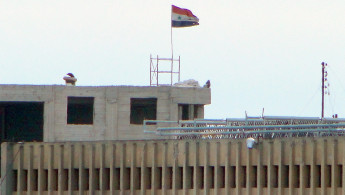Syria's longest serving prisoner still detained 40 years later
Wednesday marks 40 years since the detention of Ragheed Al-Tatari, Syria’s longest-serving prisoner, arrested in 1980 when he refused to take part in military operations in the city of Hama.
A former air force pilot, Ragheed, was 20 at the time of his arrest and is now approaching his 67th birthday.
He has become an icon for detainees in Syria's infamous prisons, where horrific accounts of torture are told by those lucky few who have made it out alive.
40 عام في سجون أسد .
— غزوان طاهر قرنفل (@G2218245) November 29, 2020
رغيد الططري . pic.twitter.com/qMcUUbpVSz
"There are no words sufficient to describe Ragheed. Everyone who knows him is impressed by his bold and strong-willed nature. Despite enduring decades of systematic oppression and torture, they could not break his spirit or rid him of his smile," says Diab Serrih from the Association of Detainees and the Missing in Sednaya Prison (ADMSP), who spent five years imprisoned with Al-Tatari.
"His case illustrates the Syrian regime's ruthless and ongoing desire to punish any form of opposition and deny detainees their right to justice and a fair trial," Serrih added.
Ragheed, who has been denied a right to a fair trial and tortured at the notorious Sednaya prison, was arrested after refusing to participate in Syrian regime airstrikes during the Hama uprising.
The uprising, which started in 1976 and ended in a fierce regime crackdown in 1982, pitted the Syrian army against the Muslim Brotherhood and other mainly Islamist groups.
While the official death toll remains unknown, estimates say the number of fatalities ranges between a couple of thousands to tens of thousands.
Ragheed was charged with disobeying orders but was later acquitted and dismissed from the air force. He fled to Jordan and then to Egypt where he attempted to seek asylum, but his application was rejected.
On 24 November 1981, upon his return to Syria, Ragheed was arrested at Damascus Airport. Three decades later, he discovered that a military tribunal had found him guilty of allegedly disclosing information to a foreign state.
Proceedings before the regime's military courts are entirely arbitrary. Human rights activists have long argued that these courts cannot be considered to constitute a legitimate trial.
Ragheed’s son, Wael, now based in Canada, said his father’s prolonged detention had left him in a state of trauma till this day.
"I couldn’t conceive what a human could do so he would deserve such a fate. I have so many questions that I have never got the chance to ask him. My dad spent more than 40 years in jail for no reason, deprived of his family - no one deserves this. They took everything away from him, his voice, his freedom. I want to shout loud enough so the world can hear about this injustice," he said.
Riyad Avlar, a close friend of Ragheed’s who spent 21 years in detention in Syria and is also a co-founder of ADMSP, describes him as a tenacious man with strong principles despite being kept at "the most terrifying place in the world".
"He was always smiling and trying to spread happiness, even while detained in the most terrifying place in the world,” he said.
"He would make dough out of leftover breadcrumbs and create art sculptures, sharing with us his beautiful work. He made us laugh and kept our spirits up to help us cling on to hope."
Executive Director of The Syria Campaign, Laila Kiki, called on the international community to take action to demand the release of Ragheed and all others being kept in Syrian jails, as more countries move to normalise ties with the regime in Damascus.
"Ragheed Al-Tatari’s case is a reminder that unlawful detention is at the core of (President Bashar Al) Assad’s rule of Syria. The world must take action to demand the release of Ragheed and all others detained for their opinions or peaceful activism," Kiki said.
"Without justice and accountability for all those unlawfully detained, imprisoned or killed, there can be no real peace and stability in Syria."
UAE Foreign Minister Sheikh Abdullah bin Zayed Al-Nahyan met with Assad in Damascus earlier this month, as they discussed ways of developing cooperation and investment opportunities.
Soon after, it was announced that the Syrian regime signed a contract with a group of companies from the UAE to build a solar power station in a Damascus suburb.
More Arab countries have voiced a readiness to normalise ties with tje Syrian regime, which is expected to regain its seat in the Arab League after being kicked out at the onset of the war in 2011.
Syria has been embroiled in conflict for over a decade, which has killed hundreds of thousands of people, displaced half the population, and left much of the country destroyed.
Syrian regime forces now control much of the country, largely due to allies Russia and Iran and their proxies, which have helped tip the balance of power in Assad's favour.





 Follow the Middle East's top stories in English at The New Arab on Google News
Follow the Middle East's top stories in English at The New Arab on Google News


